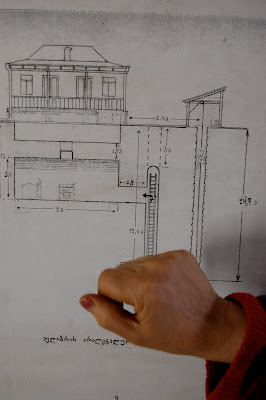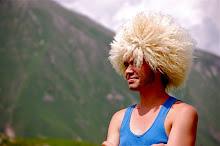
Since 2000, Art Villa Garikula has been improving its original project to create an art center in the countryside where professionals and students can meet to exchange ideas about art techniques and design. Created by Karaman Kutateladze, with support from the government, the project remains focused on Garikula.
The Art Villa was created from very humble beginnings. Artists came from the busy streets of Tbilisi in order to express themselves in a beautiful place where vineyards and orchards grow patiently in the sun. A few years and some renovations later, Garikula became a home for artists, fulfilling the initial plans for the space. Artists have habitually come to the region since the 19th century and one of the main buildings in Garikula was built in 1885 by a Polish man called Bolgarsky, who thought this place was healthy for him. Later on the building was owned by Vera Beletskaya, an aquarellist, who was expropriated in 1923 by the Soviets and finally, during the Soviet era, Garikula was dedicated to children.
For Kutateladze, Art Villa Garikula is a project that Georgia and Georgians need. In fact Kutateladze’s family roots are interwoven within art in Georgia, from Kirill and Ilya Zdanevich to Apollon Kutateladze, founder of the Tbilisi Art Academy.
“We have to educate people in arts, because if we don’t, they will choose [violence]. It’s better to hold a video camera than a Kalashnikov gun,” Kutateladze said. “Art Villa Garikula’s project is a way to integrate Georgia within the international artistic community.”
The Georgian government has supported the project since the beginning and the main building is state property, which has a contract that has been passed between state authorities and the artists’ fund.
“Without support from the state, it would not have been possible. Our relation is a model of partnership between the state and an NGO,” a local artist said.
Year long, international events are organized in Art Villa Garikula. Artists come from all over the world, including from the U.S., Austria, France, Canada, Italy, and meet for a festival in Kaspi’s valley. “Festinova 2009,” the big annual art festival, took place in early November, but next year it will be held in early October, due to weather conditions.
For four years now, Kutateladze has tried to organize a festival with Russian, French and Italian artists. The festival would combine art, gastronomy and wine.
“Now we are trying to make a virtual project because it is not possible to hold it in Georgia or Russia.” Kutateladze said. “The idea is to create, not to destroy. But there is political pressure that prevents us from organizing such a happening.”
Recent history is not helping Kutateladze’s art project develop with his northern neighbor any faster, but he said he still hopes the festival can move forward.
“You know, Putin’s project is old fashioned; it is a caricature of an old political project. We don’t know what is going to happen with this giant country. They have weapons, natural resources; they are dangerous,” Kutateladze said. “In Georgia, we remember when we weren’t able to leave the country, and nobody wants that anymore. Garikula’s project is small but it can help make things change,”
Current trends in Georgian contemporary art mirror Georgia’s history, according to Kutateladze, who said post-modernistic art doesn’t exist in Georgia.
“We don’t have the same history as Western countries. Europe has to understand our state of mind, between the Soviet Union and now. We are not post-modernists; we live in a post-socialist realism,” Kutateladze said
In fact, Georgian art history is not really known in Europe and Kutateladze laments this fact saying “You know, our last avant-garde artist died in 1953; it was Stalin.”
Georgia is changing everyday and Kutateladze said he hopes that through art and Art Villa Garikula, the country will find its way.
“Everybody has the right to build his own paradise. People grew up in socialism. Now they are living in crazy capitalism where the only value is money,” he said. “Art will help them to find their own way. Our art center has a goal to help young people find their future.”













